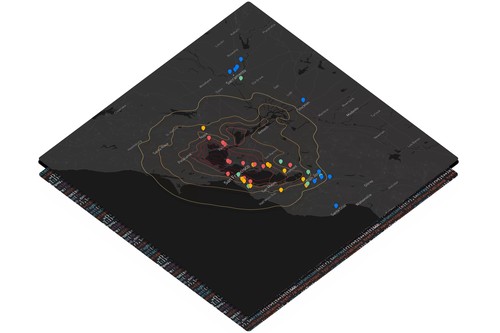
Shaking up the market
A startup has raised $5m to help monitor the impact of earthquakes. California-based Safehub uses a network of distributed sensors to detect seismic events, and artificial intelligence to predict their effect on structures.
This, the company says, can be useful not just for planning emergency response – but also for calculating financial loss estimates, including building damage and business interruption losses.
Forewarned is forearmed
The US suffers around 15 earthquakes per year with an average magnitude of 7 or greater – although there could always be a much larger event right around the corner.
This amounts to an annual cost of $6.1 billion in building stock losses, according to a 2017 FEMA study. But the true number is likely higher, as the estimate does not include induced seismicity – where human activity causes earthquakes or tremors.
“Our vision is a safer and more resilient world,” Andy Thompson, CEO of Safehub, said. “In the event of a natural disaster, organizations need timely and detailed information to get ahead of potential downtime and business interruption losses.”
“With our platform, business continuity and emergency response professionals can understand the extent of the problem remotely, and prioritize damage assessments with building-specific data.”
The funding round was co-led by Fusion Fund and Ubiquity Ventures. Bolt, Promus Ventures, Blackhorn Ventures, Maschmeyer Group Ventures, and Team Builder Ventures also participated.
Safehub said that it plans to use the funds to accelerate deployment to Fortune 500 companies.
“Software is leaping beyond the screen to solve more concrete business problems in the real world,” Sunil Nagaraj, managing partner of Ubiquity Ventures, said.
"Safehub uses smart hardware to help the largest companies in the world manage and monitor their buildings and offices to increase their resilience – a pain we are seeing magnified during COVID."
While its earthquake response service potentiality deals with the issue of human safety, Safehub’s terms of service note that the company is “not responsible for any damages allegedly caused by the failure or delay of the Services.
“In addition, you acknowledge that the Services, including remote access and mobile notifications, are not intended to be 100 percent reliable and 100 percent available.”
Some of Safehub’s competitors go as far as to claim their AI systems can predict an earthquake a few minutes before it hits. In Mexico City, two years after a devastating earthquake, SkyAlert twice overstated the magnitude of upcoming earthquakes – the city's head of early warning systems told the Wall Street Journal this error caused tens of thousands of workers to leave work.
About the Author(s)
You May Also Like
.jpg?width=700&auto=webp&quality=80&disable=upscale)
.jpg?width=700&auto=webp&quality=80&disable=upscale)
.jpg?width=700&auto=webp&quality=80&disable=upscale)
.jpg?width=300&auto=webp&quality=80&disable=upscale)

.jpg?width=300&auto=webp&quality=80&disable=upscale)
.jpg?width=300&auto=webp&quality=80&disable=upscale)
.jpg?width=300&auto=webp&quality=80&disable=upscale)